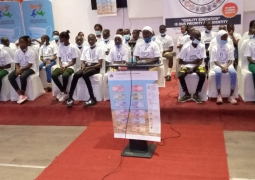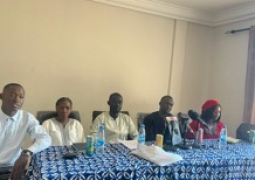
It all started when Lamin Ceesay first bought a small plot of land on the outskirts of Batokunku and he thought he had finally secured his dream home. Instead, it became a nightmare.
After losing almost all his life savings to fake land deals, Ceesay says he has seen it all - agents who vanished after taking his money, courts that moved too slowly, and a system that left him without justice.
“I bought land and even fenced, but when I went there one morning, another man was building on it. We both had papers signed by the same agent.” he recalled.
It is sad that stories like Lamin’s are common across The Gambia, where land scams, overlapping ownership claims, and unregulated sales have become part of everyday life. But a major reform is now underway.
For the first time in history, The Gambia has developed a National Land Policy, a 10-year plan (2026–2035) designed to bring order, transparency, and fairness to land ownership and administration.
The policy dubbed -West Africa Coastal Areas Resilience Investment Project (WACA), a World Bank supported initiative that promotes environmental sustainability and community resilience across the region.
Dr Muhammad Lamin Sanyang, WACA Project Coordinator in The Gambia, said the decision to support land-reform efforts was strategic.
“Many of the conflicts in this country are land-related. Without clear land use systems and proper documentation, it becomes impossible to manage resources or protect communities along the coast.”
WACA provided one million US dollars for the formulation of the National Land Policy, however, not all the budgeted amount was used in the policy development. Consultations were held in all seven regions, sixteen districts, and twelve wards.
“It was one of the most inclusive policy processes in the country’s history; local communities and traditional leaders were part of every stage,” Dr. Sanyang noted.
Before this policy, The Gambia had no unified land framework. Ministries and local councils operated independently, leaving room for duplication, fraud, and corruption.
Ebrima Sisawo, Permanent Secretary at the Ministry of Lands, Regional Government and Religious Affairs, described the previous system as costly, confusing, and unfair.
“We had overlapping mandates, weak record keeping, and many unregistered plots,” he said. “This policy will finally bring structure and fairness to land ownership.”
“The National Land Policy seeks to address three major challenges; first, Land-ownership insecurity introducing Certificates of Customary Ownership (CCOs) to formalise and protect traditional land rights. Second, Poor documentation and rising disputes establishing a modern National Land Administration Information System to map and register every plot. And institutional inefficiency and corruption creating clear lines of authority and digitising land services to make fraud easier to trace and punish.”
The policy, he added, is also designed to promote equity and inclusion. Women, youth, and people with disabilities long excluded from land ownership are specifically mentioned as priority groups.
“Women depend heavily on land for farming and business, yet they are often left out. This policy ensures equal access for everyone.” Sisawo said.
A Gender Land Strategy will be developed to support women’s ownership and strengthen their participation in decision-making.
Although the policy deals with land across the country, it is closely tied to WACA’s broader mission of coastal resilience. Erosion, flooding, and climate-change pressures have made proper land-use planning essential.
“Land is the foundation of all human activity, you cannot protect our coasts or our livelihoods without effective land reform,” Dr Sanyang explained.
Through WACA’s guidance, environmental safeguards and coastal-zoning principles were built into the policy, aligning with World Bank and African Union land-management standards.
“All funds were disbursed transparently. Requests had to be justified, activities documented, and reports submitted for every expenditure.”
He highlighted that moving forward, policy implementation will be monitored through the national development planning framework and tracked as part of IMF benchmarks for governance and public-sector reform.
PS Sisawo outlined that the implementation of the National Land Policy will roll out in three phases over ten years. The first phase (2026–2028) will focus on setting up new institutions, digitising records, and public education.
A National Land Policy Communication Strategy, he added, will also be launched to help citizens understand their rights and responsibilities.
“Ordinary Gambians must know how to protect their land rights. Awareness is as important as reform itself.”
For victims like Lamin, the new reforms may have come too late to recover what was lost but they represent hope that others will not suffer the same fate.
“I don’t know if I’ll ever get my land back. But if this new policy can stop people from being cheated like I was, then that means something.”
WACA’s support has gone beyond funding a policy and has laid the groundwork for Gambians to reclaim their land, dignity, and confidence in a system that once failed them.
“This is not just about documents, it’s about fairness, resilience, and ensuring that every Gambian no matter their background can stand on land that truly belongs to them.”
The National Land Policy (2026–2035), funded by the West Africa Coastal Areas Resilience Investment Project (WACA), is The Gambia’s first unified framework for land management. It aims to strengthen tenure security, promote transparency, protect vulnerable groups, and ensure sustainable use of land and coastal resources.
Stakeholders from government, WACA, and civil society at the validation of The Gambia’s first National Land Policy are optimistic that this landmark framework will help end land conflicts while strengthening ownership rights for ordinary Gambians.





